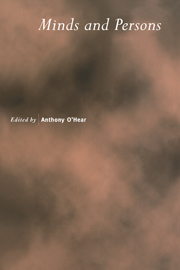Book contents
- Frontmatter
- Contents
- Preface
- Notes on Contributors
- Perceptual, Reflective and Affective Consciousness as Existence?
- The Domain of Folk Psychology
- Minds, Persons and the Unthinkable
- Moderately Massive Modularity
- A Theory of Phenomenal Concepts
- Free Will and the Burden of Proof
- Materialism and the First Person
- Language, Belief and Human Beings
- Human Minds
- Non-Personal Minds
- Personal Agency
- Mental Substances
- Mind and Illusion
- Index
Materialism and the First Person
Published online by Cambridge University Press: 04 August 2010
- Frontmatter
- Contents
- Preface
- Notes on Contributors
- Perceptual, Reflective and Affective Consciousness as Existence?
- The Domain of Folk Psychology
- Minds, Persons and the Unthinkable
- Moderately Massive Modularity
- A Theory of Phenomenal Concepts
- Free Will and the Burden of Proof
- Materialism and the First Person
- Language, Belief and Human Beings
- Human Minds
- Non-Personal Minds
- Personal Agency
- Mental Substances
- Mind and Illusion
- Index
Summary
Here are some sentences from Fred Dretske's book Naturalising the Mind:
For a materialist there are no facts that are accessible to only one person… If the subjective life of another being, what it is like to be that creature, seems inaccessible, this must be because we fail to understand what we are talking about when we talk about its subjective states. If S feels some way, and its feeling some way is a material state, how can it be impossible for us to know how S feels? Though each of us has direct information about our own experiences, there is no privileged access. If you know where to look, you can get the same information I have about the character of my experiences. This is a result of thinking about the mind in naturalistic terms. Subjectivity becomes part of the objective order. For materialists, this is as it should be.
I think Dretske is right: for the materialist, there can be no such thing as privileged access. But the denial of privileged access looks wildly implausible. A being incapable of feeling pain can have access to all the physical facts relating to pain, but not have the faintest idea what pain feels like; and so for all sensations. No amount of knowledge of the physical facts will allow one to understand what the experience feels like, a fact that has become known as ‘the explanatory gap’.
- Type
- Chapter
- Information
- Minds and Persons , pp. 123 - 140Publisher: Cambridge University PressPrint publication year: 2003
- 1
- Cited by



